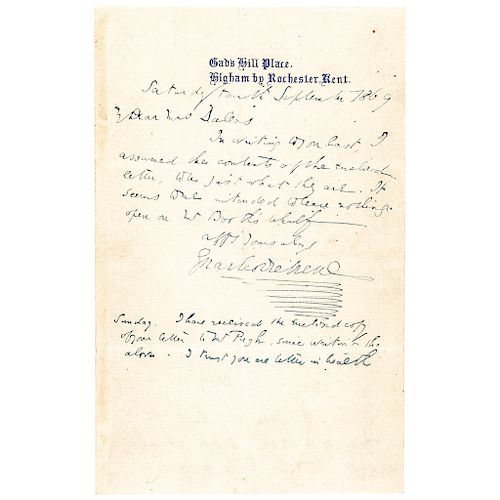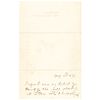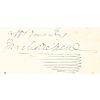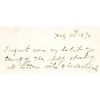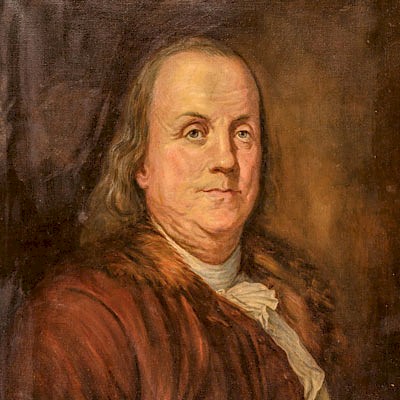1869 Author CHARLES DICKENS Mentions Actor EDWIN BOOTH Autograph Letter Signed
Lot 23
Estimate:
$3,000 - $4,000
Absentee vs Live bid
Two ways to bid:
- Leave a max absentee bid and the platform will bid on your behalf up to your maximum bid during the live auction.
- Bid live during the auction and your bids will be submitted real-time to the auctioneer.
Bid Increments
| Price | Bid Increment |
|---|---|
| $0 | $10 |
| $200 | $20 |
| $300 | $25 |
| $500 | $50 |
| $1,000 | $100 |
| $2,000 | $200 |
| $3,000 | $250 |
| $5,000 | $500 |
| $10,000 | $1,000 |
| $20,000 | $2,000 |
| $30,000 | $2,500 |
| $50,000 | $5,000 |
| $100,000 | $10,000 |
| $200,000 | $20,000 |
| $300,000 | $25,000 |
| $500,000 | $50,000 |
About Auction
By Early American History Auctions
Aug 24, 2019
Set Reminder
2019-08-24 12:00:00
2019-08-24 12:00:00
America/New_York
Bidsquare
Bidsquare : Autographs, Colonial Currency, Political Americana, Historic Guns
https://www.bidsquare.com/auctions/early-american-history-auctions/autographs-colonial-currency-political-americana-historic-guns-4347
Historic Autographs • Colonial Currency • American Civil War Colonial Era • Revolutionary War • Political Americana • Black History Early American History Auctions auctions@earlyamerican.com
Historic Autographs • Colonial Currency • American Civil War Colonial Era • Revolutionary War • Political Americana • Black History Early American History Auctions auctions@earlyamerican.com
- Lot Description
Autographs
1869 Rare Charles Dickens Autograph Letter Signed Mentions Actor Edwin Booth, John Wilkes Booth's Brother!
CHARLES DICKENS (1812-1870). English Writer and Social Critic. He created some of the world's best-known fictional characters and is regarded by many as the greatest novelist of the Victorian era.
September 10, 1869-Dated Autograph Letter Signed, "Charles Dickens", 1 page, measuring 4.5" x 7", Letterhead of Gad's Hill Place, Higham by Rochester, Kent, (England), Choice Extremely Fine. The most extensive 8-line penned flourish added below his large 2.75" long signature we have seen. A lovely example of a Handwritten Letter by Dickens, penned in deep blue ink on clean "Gad's Hill Place" printed letterhead, only a year before his death. Of important significance, Dickens makes reference to Edwin Booth, who was the leading Shakespearean Actor of the time and the brother of Abraham Lincoln's Assassin, John Wilkes Booth. In 1869 Edwin founded Booth's Theatre in New York, a spectacular theatre that was quite modern for its time. Some theatrical historians consider him the greatest American actor, and the greatest Prince Hamlet, of the 19th century. There is also other known documentation (not included) that Dickens had negotiated directly with Booth on behalf of Lytton in 1869 (the same year of this letter), for a possible New York production of Lytton's "The Rightful Heir." This historical Letter reads, in full:
"Saturday Tenth September 1869 -- Dear Mrs Dallas -- In writing to you last, I assumed the contents of the enclosed letter, where just what they are. It seems one intended to leave nothing open on Mr Booths behalf. - affectionally yours always - (Signed) Charles Dickens".
This Letter continues below, also written in the hand of Dickens: "Sunday. - I have received the finalized copy of your letter to Mr Pugh, since writing the above. I trust you are better in health".
Overall, an impressive example of a Charles Dickens personal Autograph Letter Signed, that was written in the last year of his life. Also, it is from his home at Gad's Hill, where he felt a shared love with Shakespeare for the spectacular countryside and with a special reference to the famous actor Edwin Booth. Noted on blank reverse side in brown ink at bottom: "Feby 11th 1871 -- I regret now my habit of tearing off the half sheet of all letters not to be destroyed". An apparent reference to retaining full and complete records of documents and his letters.
Charles Dickens mentions Mr. Booth (Edwin Booth), a foremost 19th century American actor who toured throughout America and the major capitals of Europe, performing Shakespearean plays. In 1869 he founded Booth's Theatre in New York, a spectacular theatre that was quite modern for its time. Some theatrical historians consider him the greatest American actor, and the greatest Prince Hamlet, of the 19th century.
There are numerous letters, correspondences and references of admiration that existed between Edwin Booth and Charles Dickens, including letters showing Dickens referring to him as a gentleman of "great zeal and energy" and others referencing that he (Dickens) is "sure from my experience that his (Booth's) charges will be correct, will you kindly inform him without waiting for my receipt of his promised communication - that you are ready to pay them on my account, if he will let you know their amount?"
There is also known documentation (not included) that Dickens had negotiated directly with Booth on behalf of Lytton in 1869 (the same year of this letter), for a possible New York production of Lytton's "The Rightful Heir."
Dicken's love of Shakespeare cannot be overstated. He was so enamored with his plays and used to declare his firm belief that Shakespeare was especially fond of Kent, and that the poet chose Gad's Hill and Rochester for the scenery of his plays from intimate personal knowledge of their localities. He said he had no manner of doubt but that one of Shakespeare's haunts was the old inn at Rochester, and that this conviction came forcibly upon him one night as he was walking that way, and discovered Charles's Wain over the chimney just as Shakespeare has described it, in words put into the mouth of the carrier in King Henry the Fourth.
There is no prettier place than Gad's Hill in all England for the earliest and latest flowers, and Dickens chose it, when he had arrived at the fulness of his fame and prosperity, as the home in which he most wished to spend the remainder of his days. When a boy, he would often pass the house with his father, and frequently said to him: "If ever I have a dwelling of my own, Gad's Hill Place is the house I mean to buy." In that beautiful retreat he has for many years been accustomed to welcome his friends, and find relaxation from the crowded life of London.
- Shipping Info
-
Early American provides in-house worldwide shipping. Please contact us directly if you have questions about your specific shipping requirements.
-
- Buyer's Premium



 EUR
EUR CAD
CAD AUD
AUD GBP
GBP MXN
MXN HKD
HKD CNY
CNY MYR
MYR SEK
SEK SGD
SGD CHF
CHF THB
THB